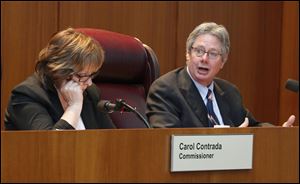
Lucas County applications to change
Box asking if potential employee has conviction would be removed
10/28/2013
Lucas County Commissioner Pete Gerken said stripping language from the county’s online employment screening process removes a barrier that may prohibit skilled, educated candidates from employment and scares off ex-offenders from applying for jobs.
The Lucas County Commissioners will announce today that the county will remove a question from job applications that asks applicants if they have a criminal record.
Commissioner Pete Gerken said stripping language from the county’s online employment screening process removes a barrier that may prohibit skilled, educated candidates from employment and scares off ex-offenders from applying for jobs.
“We want people to achieve gainful employment,” Mr. Gerken said. “We are a major employer. We want to make sure we get the best applicants available.”
A resolution that would amend the county’s employment policy to omit the criminal record question will be taken up at Tuesday’s commissioners’ meeting.
The policy would only apply to the departments under the commissioner’s authority, which includes Job and Family Services, clerk of courts, the dog warden’s office, and treasurer.
The proposed fix to the county’s job application process is in step with the national “ban the box” movement that believes questions involving criminal records are discriminatory.
A report by the National Employment Law Project estimates 65 million Americans — one in four adults — have criminal records that may show up on routine background checks, causing them to be denied jobs.
The group says 53 cities and counties in 22 states have adopted “ban the box” initiatives, which do not allow employers to inquire about prospective employees’ criminal records.
Lucas County would join Cleveland, Cincinnati, and Canton as communities in Ohio that have eliminated the question box. Other major cities that have adopted the initiative include Chicago, Detroit, New York, Austin, Seattle, and San Francisco.
Last year, the federal Equal Employment Opportunity Commission said it was illegal to screen out employees unless the crime was directly related to the job.
Tina Skeldon Wozniak said that asking whether applicants have a misdemeanor or felony conviction rules out a qualified candidate whose conviction may have been years ago or unrelated to the position they seek. “People know if they have to check that box it is hard to get employment,” she said. “You are more than likely not going to get an interview if you check that box. It is among the challenges that people who have been convicted of a crime face in our community.”
Mr. Gerken said the policy only applies to the initial stage of submitting job applications and candidates may undergo criminal background checks as they proceed through the screening and interview process.
Carol Contrada, president of the commissioners, said the resolution is designed to allow job candidates to be judged on experience and qualifications that are needed for the job for which they applied.
She said applicants with criminal records will be given the opportunity to explain the details and history of convictions and rehabilitation programs successfully completed.
“The county human resources department will assist each department in understanding how best the Equal Employment Opportunity Commission’s practices work in this area and how they can ask those questions and find a way to get the most qualified employees,” she said.
Alaryce Shea, a job coach and coordinator of EOPA’s Employment Readiness Training Program, which prepares ex-offenders to enter the work force, said removing the box from applications allows people to at least get their foot in the door and explain his or her ability.
“Otherwise, their application gets thrown in the garbage and they don’t get their chance at a face-to-face meeting. They don’t get any sort of a chance,” she said. “This gives them a little bit extra chance at a job.”
Germaine Kirk, who oversees the jail and prison ministries for the Diocese of Toledo’s Catholic Charities and counsels ex-offenders, said that the check box on applications is often abused by employers.
“The whole system really needs to be looked at,” she said. “It is important for our communities to have contributing, responsible citizens and that way everybody benefits. They not only get a paycheck, but they become a taxpayer.”
Contact Mark Reiter at: markreiter@theblade.com or 419-724-6199.